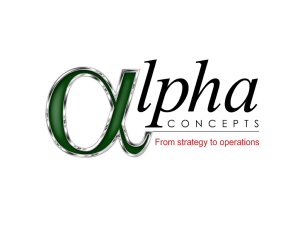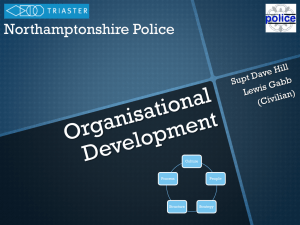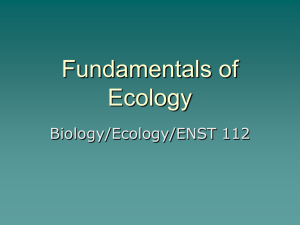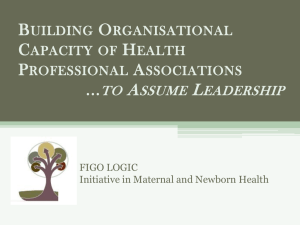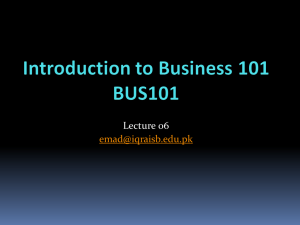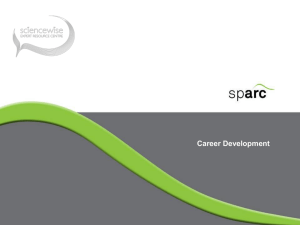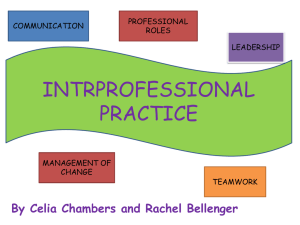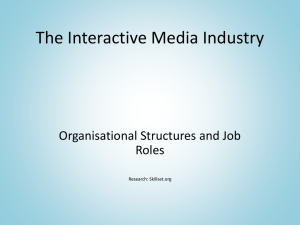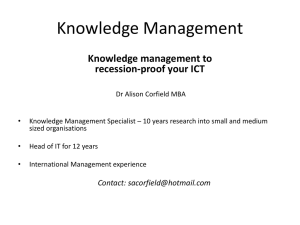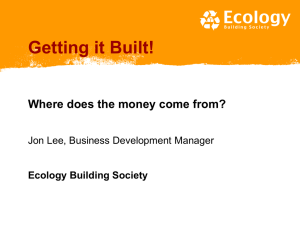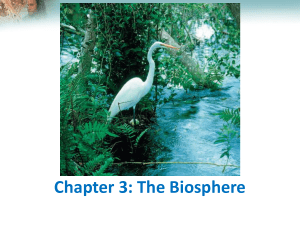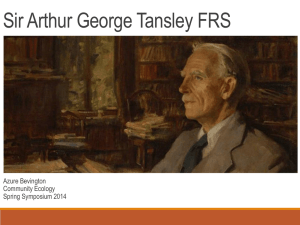ORGANISATIONAL ECOLOGY AND DYNAMIC CAPABILITIES
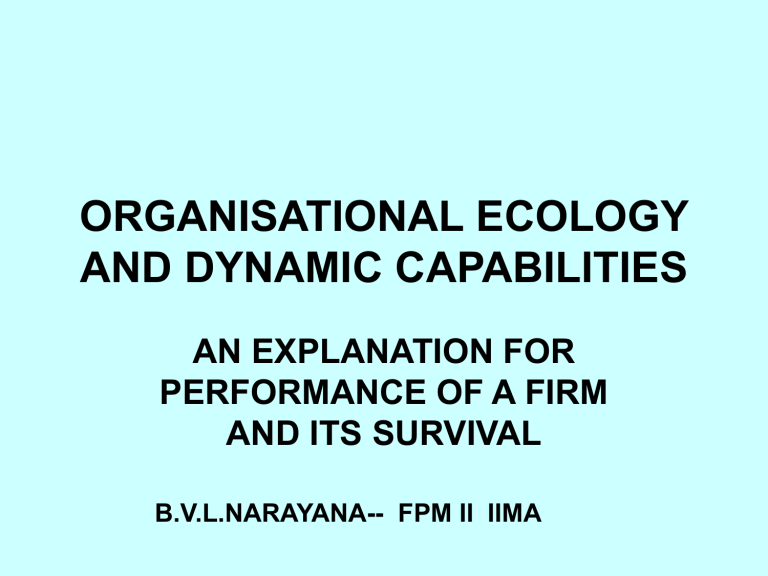
ORGANISATIONAL ECOLOGY
AND DYNAMIC CAPABILITIES
AN EXPLANATION FOR
PERFORMANCE OF A FIRM
AND ITS SURVIVAL
B.V.L.NARAYANA-- FPM II IIMA
ORGANISATIONAL ECOLOGY
AND DYNAMIC CAPABILITIES
"Om Poornamadah Poornamidam
Poornat Poornamudachyate Poornasya
Poornamadaya Poornamevavasishyate.“
"What is whole, this is whole; what has come out of the whole is also whole.
When the whole is taken out of the whole, the whole still remains whole."
(RAMAYANA – C RAJAGOAPALCHARI)
ORGANISATIONAL ECOLOGY
AND DYNAMIC CAPABILITIES
• GENESIS OF ORGANISATIONAL ECOLOGY-
• 1970’S PREDOMINANT VIEW THAT OF
ADAPTATION BASED ON RATIONALITY AND
ACTIVE MANAGERIAL CHOICES
• POPULATION ECOLOGY LAID EMPAHSIS ON
DETERMINISM BY THE
ENVIRONMENT(HANNAN AND FREEMAN
1977) ADAPTATIO PERSPECTIVE
SUPPLEMENTED WITH A SELECTION
ORIENATATION
ORGANISATIONAL ECOLOGY
AND DYNAMIC CAPABILITIES
ASSUMPTIONS OF THE THEORY;
• Diversity is a property of aggregates of organizations
• Organizations often have difficulty devising and executing changes fast enough to meet the demands of uncertain , changing environments
• The community of organizations is rarely stable. ( Baum 1999 )
ORGANISATIONAL ECOLOGY
AND DYNAMIC CAPABILITIES
• COMPONENTS OF THE THEORY
• FOCUS ON SELECTION
• UNIT OF ANALYSIS ARE POPULATIONS OF
ORGANISATIONS
• USE EXPLICIT COMPETITION MODELS
• EXPLAIN ISOMORPHISM
• USE NICHE THEORY TO EXTEND TO DYNAMIC
ENVIRONMENTS
• USE LONGITUDINAL DATA
• AIM TO UNDERSTAND WHY THERE ARE SO MANY
TYPES OF ORGANISATIONS(BAUM 1999)
ORGANISATIONAL ECOLOGY
AND DYNAMIC CAPABILITIES
• EVOLUTION OVER TIME (AMBURGEY AND
RAO 1996)
• 1977-1988
• EMPHASIS ON VITAL RATES AND THEIR
UNDERSATNDING
• CHANGE NOT CONSIDERED
• ACKNOWLEDGED IMPORTANCE OF
INSTITUTIONAL FACTORS
• ENSURED METHODOLOGICAL
CONSISTENCY
ORGANISATIONAL ECOLOGY
AND DYNAMIC CAPABILITIES
• 1988-1990(AMBURGEY AND RAO 1996)
• SHIFT OF FOCUS FROM VITAL RATES TO CHANGE
• USE OF ALTERNATIVE MODELS --TECHNOLOGICAL
AND MARKET DYNAMIC MODELS
• INCREASED EMPIRICAL STUDIES
• INTRODUCTION OF MASS DEPENDENCE MODEL
• VARIATION IN THE LIABILITY OF NEWNESS MODEL
• CONTRIBUTIONS FROM FIELDS OF ECONOMICS,
STRATEGIC MANAGEMENT
• INCORPORATED CONCEPTS FROM RESOURCE
DEPENDENCE,TCE, STRATEGIC MANAGEMENT
ORGANISATIONAL ECOLOGY
AND DYNAMIC CAPABILITIES
• 1990-TILL DATE(AMBURGEY AND RAO
1996)
• PREDOMINANCE OF THEORY OVER
EMPIRICISM
• ATTEMPT TO INTEGRATE PROCESSES
AT DIFFERENT LEVELS OF ANALYSIS
• DIVERSITY OF CONTRIBUTORS
FURTHER INCREASED
ORGANISATIONAL ECOLOGY
AND DYNAMIC CAPABILITIES
• CONTRIBUTIONS AND OUT LOOK FOR FUTURE
• CONCEPTS ARE ABLE TO TACKLE WIDE VARIETY
OF PROBLEMS
• METHODOLOGICAL RIGOR AND STRENGTH OF
GENERALISATION
• FUTURE OUT LOOK(AMBURGEY AND RAO 1996)
– explore area of organizational economics
– Look at growth of network forms to study rise and fall of intermediary forms.
– Look at co evolution of institution and technology with organizations.
– Look at endogenous population change –co evolution of populations.
ORGANISATIONAL ECOLOGY
AND DYNAMIC CAPABILITIES
• RESOURCE BASED VIEW
• COMPETITIVE BASED ON
DIFFERENCES IN RESOURCES AND
CAPABILITIES(PETERAF 1993)
• Teece et al. (1997 :) define dynamic capabilities as ‘the firm’s ability to integrate, build, and reconfigure internal and external competences to address rapidly changing environments
ORGANISATIONAL ECOLOGY
AND DYNAMIC CAPABILITIES
Source : Helfat and Peteraf 2003
ORGANISATIONAL ECOLOGY
AND DYNAMIC CAPABILITIES
• A firm’s absorptive capacity is the ability of a firm to recognize the value of new, external information, assimilate it, and apply it to commercial ends . (COHEN LEVINTHAL 1990)
• Dynamic capabilities are shaped by the coevolution of learning mechanisms (organizations absorptive capacity) such as experience accumulation, knowledge articulation and knowledge codification. (ZOLLO AND WINTER
2002)
ORGANISATIONAL ECOLOGY
AND DYNAMIC CAPABILITIES
• The organizational ecology theory studies phenomenon at the population and community level but essentially misses out the mechanics at the intra firm level. The resource based view looks at the intrafirm level processes but does not explore processes at the population and community level. Organizational ecology theory has its strengths in using dynamic models and strong empirics using longitudinal data while resource based view uses more of case methodology and uses cross section data.
ORGANISATIONAL ECOLOGY
AND DYNAMIC CAPABILITIES
• Organizational ecology hAs already incorporated the concepts of institutional theories and transaction cost economics, and by incorporating the concepts of resource based view it thus creates a Meta paradigm which is in a position to look at organizational theory holistically.
ORGANISATIONAL ECOLOGY
AND DYNAMIC CAPABILITIES
• This organizational capability arises out of the collective abilities of the individual’s memory
(variety in his stored enactments or experience including knowledge and skills) and the organizational communication processes of sensing, transmission, storage and retrieval of the collective memory of the organization. These processes also involve rules for selection, replication, recombination and retention of these variations in the behavior. It is these processes which form the dynamic capabilities (WIECK
1979 )
ORGANISATIONAL ECOLOGY
AND DYNAMIC CAPABILITIES
• Adaptive evolutionary processes are often rooted in Core Micro-strategies.
• Adaptive evolutionary processes of innovation and growth are pursued through recombination of existing micro-strategies according to a limited repertoire of recursive recombination patterns
•
• The organization leaders purposefully guide evolutionary processes —strategic intent
(Salvato 2003 )
ORGANISATIONAL ECOLOGY
AND DYNAMIC CAPABILITIES
• Continuous ability to respond to the environment in appropriate fashion with desired efficiency and speed enables continuous adaptation or change. Thus the dynamic capabilities define the organizational capability to enable the identified change on a continuous basis.
ORGANISATIONAL ECOLOGY
AND DYNAMIC CAPABILITIES
ORG ECO+INSTTHEORIES COMMUNITIES
DETRMINISM
AND
SELECTION
ORG ECO THEORY
POPULATIONS
ORG ECO +RBV
ORGANISATIONS
ORG
ECO+STR
CHOICE
INTRAFIRM PROCESSES
VOLITION
AND
ADAPTATI
ON
ORGANISATIONAL ECOLOGY
AND DYNAMIC CAPABILITIES
• RAYS OF KNOWLEDGE(GNANA)– VARIATION
• INTELLIGENCE MATURES –WISDOM—SELECTION --
ENACTMENT
• WISDOM INTEGRATES INTO LIFE—ISSUES AS
ACTION —BHAKTI– RETENTION AND
RECOMBINATION —ROUTINES—processes to ensure recombinations
• IMMATURE KNOWLEDGE IS USELESS TINSEL–
VARIATIONS NOT INTEGRATED INTO MMEMORY OF
ENACTMENTS —ARE LOST
• PERCEPTION—MEANING—KNOWLEDGE—WISDOM-
ACTION – SUSTAINED PERFORMANCE
• SOURCE—C RAJAGOPALACHRI—BHAJA GOVINDAM
